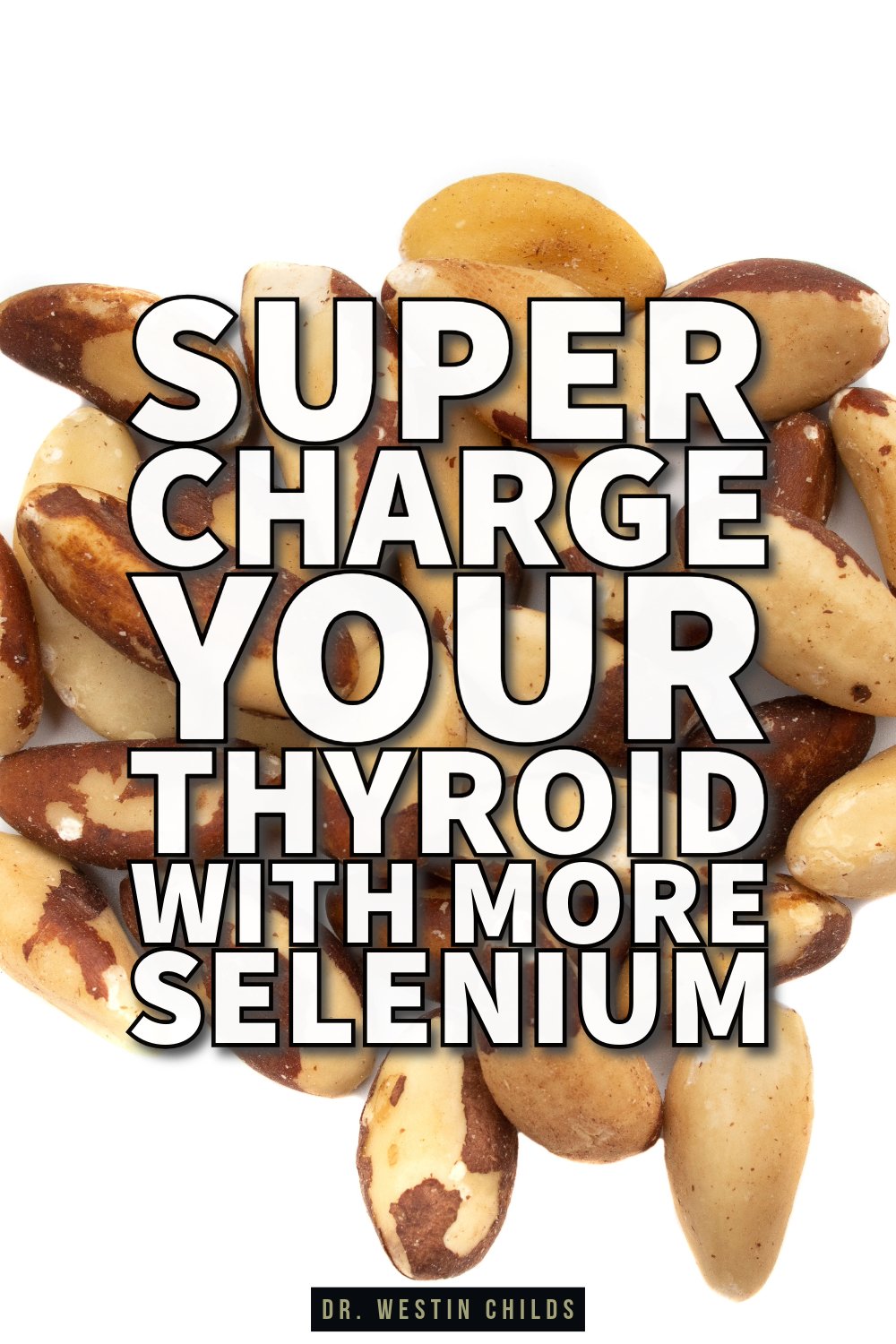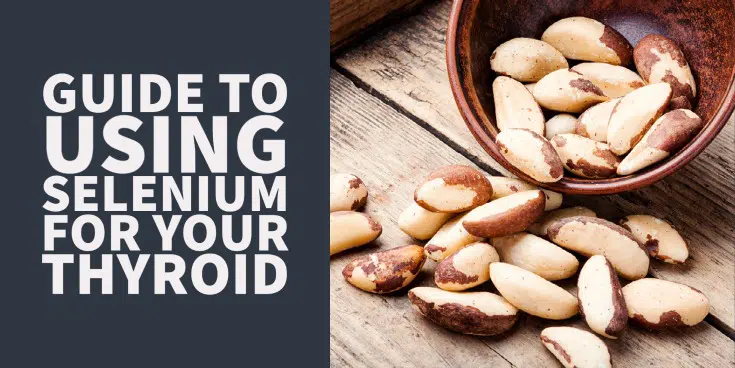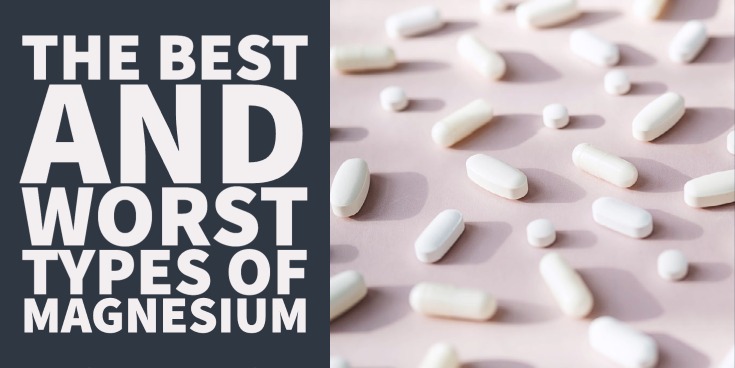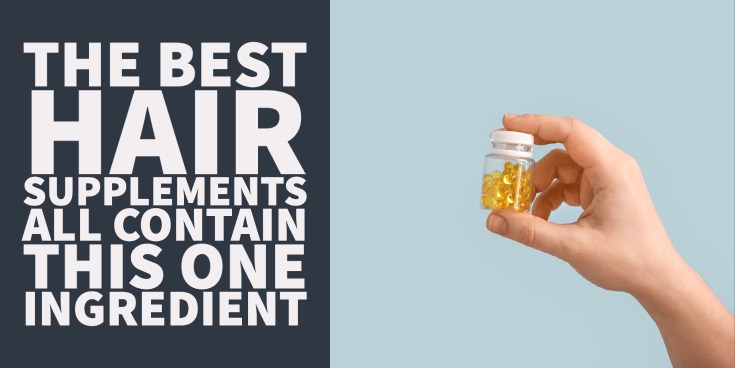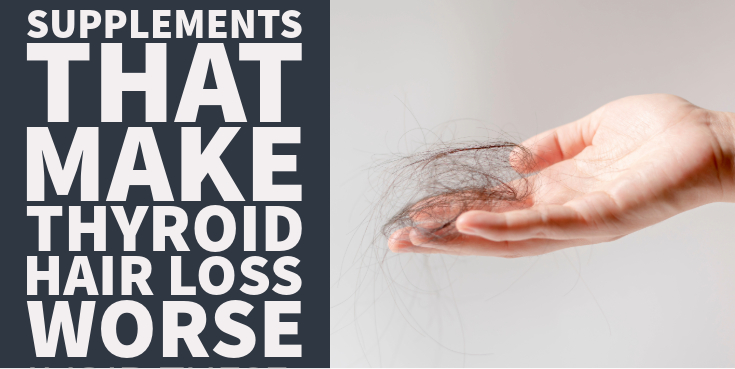Supplementing with selenium may provide a way to enhance your thyroid function in a natural way.
Whether you’ve heard of selenium before (or this is your first time), you’ll find all the information you need to get started with this micronutrient.
Today you’ll learn:
- Whether or not you should use selenium
- How to use it correctly if you do (and what dose to take)
- What side effects to watch out for while using it (and how to avoid toxicity)
- How to combine it with other nutrients to improve its effectiveness
- Whether or not selenium selenium will help with weight loss
- And much more…
Let’s dive in:
Selenium & Thyroid Function
Selenium is a micronutrient that is heavily involved in ensuring proper thyroid function (among other very important functions).
In fact, selenium is highly concentrated in the thyroid gland and contains more selenium per gram of tissue than any other organ in your body.
But what exactly is selenium and how does it help your thyroid?
Selenium is an essential trace element required for human flourishing.
It is important because it forms a portion of several key proteins in the body known as selenoproteins.
These proteins, which require selenium to function, help your body to produce thyroid hormone, protect your thyroid cells from cell damage by producing anti-oxidants, and help your body break down and utilize thyroid hormone (thyroid conversion) (1).
In essence:
Selenium and selenoproteins allow your thyroid to produce adequate thyroid hormone while protecting itself against free radical damage and immune dysfunction (2).
A deficiency in selenium has been associated with thyroid dysregulation, symptoms of hypothyroidism, disordered thyroid lab tests, an increased risk of developing Hashimoto’s, and so on.
There has been great interest in evaluating selenium in patients since it was discovered that selenium deficiency is a reversible cause of thyroid disease (3) and supplementing with selenium can help many different thyroid disorders.
This article is going to focus on why you may want to use selenium, how to use it correctly, and ways that you can naturally improve your thyroid function.
DOWNLOAD FREE RESOURCES
Foods to Avoid if you Have Thyroid Problems:
I’ve found that these 10 foods cause the most problems for thyroid patients. Learn which foods you should avoid if you have thyroid disease of any type.
The Complete List of Thyroid Lab tests:
The list includes optimal ranges, normal ranges, and the complete list of tests you need to diagnose and manage thyroid disease correctly!
Selenium May Help Lower Thyroid Antibodies
A deficiency in selenium does more than just inhibit thyroid function in your body.
In fact, it has been shown that selenium deficiency may result in direct damage to the thyroid gland.
This process occurs due to a feedback loop in the body which results in high TSH and the accumulation of hydrogen peroxide in the thyroid gland.
Because selenium acts as an anti-oxidant (required to neutralize hydrogen peroxide), low levels of selenium are not sufficient to remove the hydrogen peroxide.
Hydrogen peroxide then accumulates in the thyroid gland resulting in fibrosis (scarring) and thyroid cell damage.
This cycle is thought to be accelerated with the use of Iodine supplements in those who are deficient and may be one of the reasons that using iodine can “stimulate” Hashimoto’s (4).
It’s not necessarily the Iodine by itself but rather the use of Iodine without also using selenium.
Imagine a scenario in which you are deficient in both selenium and Iodine.
If you take Iodine (without selenium) you may “stimulate” the production of thyroid hormone and cause more damage to thyroid tissue.
You can prevent this from happening by using both Iodine and selenium together.
It has been shown, in several studies, that using selenium in the case of Hashimoto’s thyroiditis may result in a reduction in thyroid antibodies (5).
These studies have been inconsistent, however, with some studies showing an improvement and others showing no improvement (6).
Does that mean you should avoid selenium if you have Hashimoto’s?
Not necessarily, but it does mean you should monitor your thyroid antibodies closely if you decide to take it.
It’s been my experience that using selenium if combined with iodine and other nutrients such as zinc, can sometimes reduce thyroid antibodies.
You can do this safely as long as you avoid using excessively high doses and use the right form of selenium.
Signs of Selenium Deficiency
Is it possible to have lower-than-normal levels of selenium?
The answer is yes.
As humans, we primarily acquire selenium through the foods that we consume.
And the concentration of selenium depends on the type of food and the soil in which it was grown.
This combination sets us up for potential deficiencies.
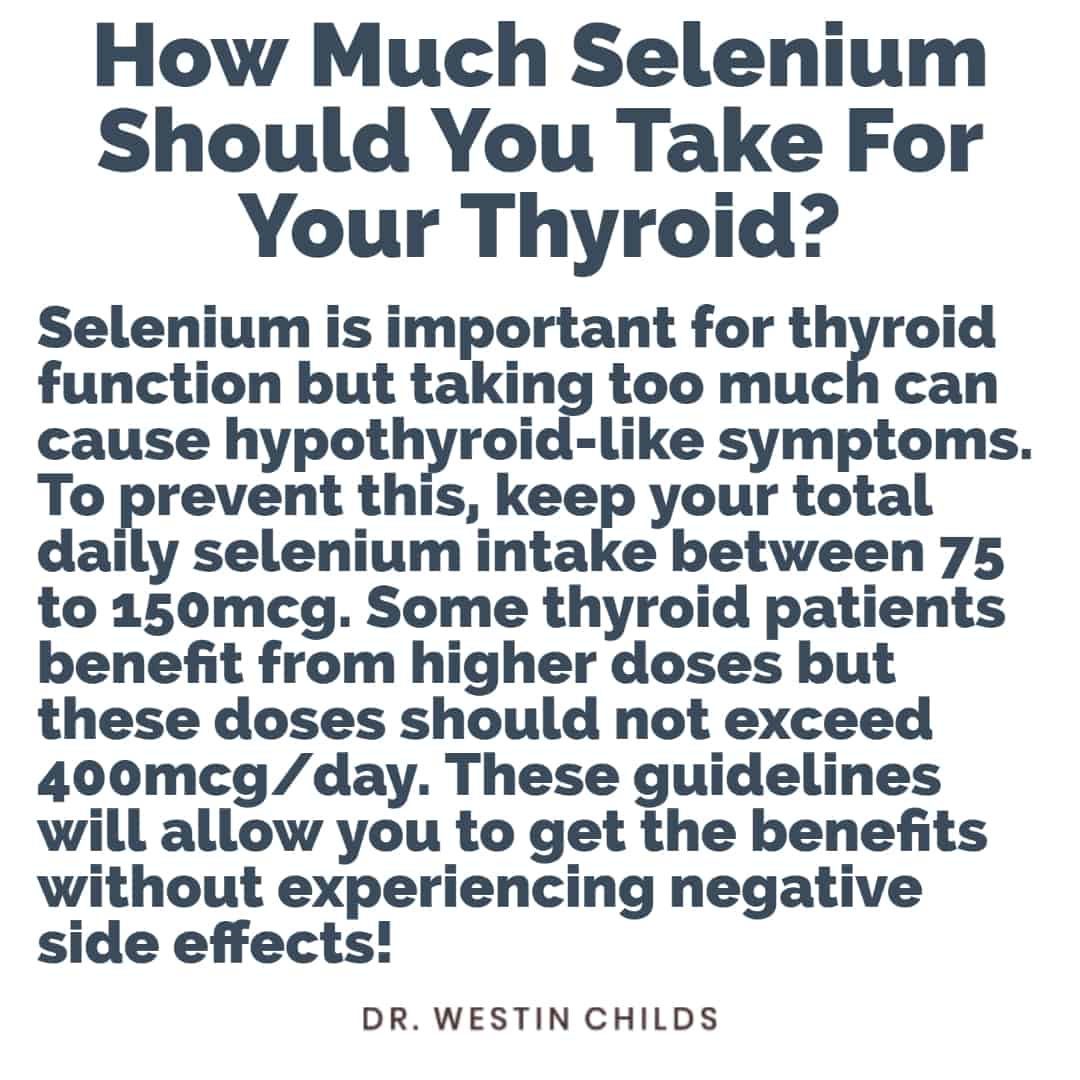
Why?
Well, for a couple of reasons:
#1. We know that the soil is becoming less nutrient-dense as we grow more and more crops.
#2. The Western diet (the standard diet of most Americans) tends to be high in refined and processed foods which don’t necessarily contain the right composition of vitamins and minerals.
Highly processed and refined foods are high in saturated fat, food colorings, chemical additives, and preservatives, and devoid of critical nutrients (7).
So, if you are consuming the standard unhealthy diet there is a high chance you may be deficient.
And, on the off chance that you are eating a healthy diet, there’s reason to suspect that even healthy foods may have sub-optimal micronutrient levels.
Both of these scenarios may result in lower than normal selenium levels necessary for thyroid function which may result in symptoms.
Symptoms of selenium deficiency include any or all of the following:
- Thyroid dysfunction (including an increased risk for Hashimoto’s and Hypothyroidism)
- Hair loss (Independent of thyroid function)
- Weakened immune system
- Fatigue
- Muscle Pain
- Slow Metabolism
- Other mineral deficiencies (such as Magnesium, Zinc, and Iron)
The presence of any, or all, of these symptoms, may be an early warning that you may be deficient in this micronutrient.
Don’t stress too much though because, even if you are deficient, you can readily “fix” the situation with supplementation.
How to Supplement with Selenium
Selenium is available in both organic and inorganic forms.
The organic forms of selenium (Selenomethionine and selenocysteine) tend to be better absorbed compared to other formulations and are preferable for supplementation.
You can get selenium either from your diet (the foods you eat) or by taking extra supplements by mouth.
I’ll briefly go over some of the foods which contain selenium and then we can discuss how to properly supplement using over-the-counter supplements.
Selenium is highly concentrated in certain foods including:
- Meat products
- Fish
- Pasta or rice
- Bread
- Cereals
- Beans and nuts (especially Brazil nuts)
Certain behaviors such as smoking and consuming alcohol and coffee have been shown to deplete selenium levels (8) even if you consume enough in your diet.
If you practice these behaviors just realize that you may need to increase the amount that you eat to compensate.
Is it preferable to get your selenium from your diet over taking supplements?
I don’t think the answer is clear-cut, but my general recommendation is to use a combination of both.
In many cases, I think it’s certainly possible, but not feasible, to get a complete array of nutrients from your diet each and every day.
It’s possible, but it requires the consumption of healthy foods day in and day out and it operates under the assumption that you are not going to “fall off” the wagon at any point.
A much more practical approach is to combine selenium supplementation with a diet that attempts to add selenium-rich foods whenever possible.
But what about dosing? How much do you actually need each day?
The recommended amount is around 50-70mcg per day for adults (9).
Supplements should have at least this amount and can even go as high as 400mcg per day (though this dose is not recommended for everyone).
A safe supplementation dose is anywhere from 50mcg to 200mcg per day and I generally recommend somewhere in the middle.
Those who have autoimmune conditions (such as Hashimoto’s thyroiditis), or practice behaviors that deplete selenium, may want to consider doses as high as 400mcg per day.
Just be sure to watch for side effects at this dose and be sure to start low and titrate up slowly!
Selenium Overdose & Toxicity
Some supplements carry with them very little chance of toxicity while others can potentially cause harm if consumed in large quantities.
You may think that all supplements which are sold over the counter are safe but this isn’t true either.
In fact, one of the most dangerous medications you can buy is available over the counter and that’s Tylenol (10).
Tylenol is easy to overdose on because of the way that it is metabolized in the body.

On the other hand, supplements like B12 are very safe to use in large quantities because any extra will be eliminated through your urine (you just pee it out).
So where does selenium fit?
Selenium is somewhere right in the middle.
It’s safe to use if used in small quantities, but it is theoretically possible to overdose if used incorrectly.
But, even with the risk of overdose, it’s still actually quite hard to reach those levels.
To illustrate this point consider this example:
Of these people, only 1 person was hospitalized and all eventually recovered.
So, while the risk of toxicity and overdose is real, the chances of you getting to that toxic dose is very unlikely.
You would need to consume pretty much an entire bottle of 200 mcg tablets of selenium each day for a month to reach those levels.
While true toxicity is rare, that doesn’t mean you might not “tolerate” selenium supplementation when you start taking it.
Intolerance to the supplement may mean that you are overly sensitive to selenium or that you simply don’t need the supplement (you are not deficient).
Symptoms of selenium intolerance may include:
- Diarrhea
- Fatigue
- Hair loss
- Joint pain
- Nail discoloration
- Nausea
If you start taking selenium and you notice any of these symptoms then you may want to reduce your dose or stop taking the supplement entirely.
Even if you do experience these symptoms they should fade within 3-4 months after you stop taking the supplement.
You can avoid selenosis (or selenium overdose) by consuming no more than 400mcg per day.
Combining Selenium with Zinc & Other Thyroid Boosters
Generally, people don’t just have a deficiency in one mineral or nutrient.
Why?
Because the behavior which leads to deficiencies (such as diet) tends to affect more than just one.
So the chances of having an isolated selenium deficiency (or a sub-optimal selenium level) without other deficiencies, is very uncommon.
This is why providers and supplement companies tend to combine nutrients together into one big supplement.
This can be dangerous, though, because you also need to ensure that you have enough (a high enough dose) of each nutrient for it to be effective.
In addition, it’s also important to understand that sometimes it’s not a good idea for you to take isolated nutrients all by themselves.
After all, is this how it happens in nature and how your body is used to receiving nutrients?
No.
Consider this example:
When you consume food you are getting multiple nutrients, phytochemicals, antioxidants, and vitamins.
These all come together and for good reason.
Isolated supplementation of high doses of nutrients such as Iodine may trigger conditions such as Hashimoto’s disease, but taking Iodine with selenium seems to protect against this problem.
The moral of the story?
It’s probably not a good idea to take isolated high doses of selenium, nor is it as effective as combining selenium with other nutrients.
Combining selenium with thyroid-enhancing nutrients such as zinc, vitamin A, iodine, and vitamin E seems to also promote better results.
You can take these all individually or you can get them in a combined supplement such as this one.
Selenium & Weight Loss
Will taking or using selenium help with weight loss?
With over 1/3rd of Americans now “obese” by BMI, weight management is becoming increasingly important.
That’s why so many people are looking for new ways to lose weight or at least manage their current weight.
How does selenium fit in?
Taking selenium as a supplement is certainly NOT a weight loss supplement or medication but there are some interesting correlations between your weight and the amount of selenium that you consume.
And this correlation is significant.
What’s not clear is whether or not it’s the selenium that is helping with the weight loss or if it’s some other factor.
It’s also important to consider that by taking selenium you may be able to naturally boost your thyroid which might also result in some weight loss.
If you experience any weight loss in this way it will probably only be minor at best, perhaps a few pounds.
The best advice is to use selenium if you suspect you are deficient but don’t use it solely or primarily as a “weight loss” therapy.
It will work best for weight loss if it is also combined with other therapies such as medications, diet, exercise, supplements, and so on.
Will Selenium Help with Hyperthyroidism?
We’ve already established that using selenium can help improve thyroid function in those suffering from Hashimoto’s and Hypothyroidism, but what about those with hyperthyroidism?
Graves’ disease, the primary cause of hyperthyroidism, is the result of an autoimmune disease.
While the symptoms of hyperthyroidism differ dramatically from hypothyroidism, the underlying etiology (meaning the cause) of both Graves’ and Hashimoto’s is the result of disordered immune regulation.
Knowing that selenium is involved in immune function it makes sense, and we would expect, that using selenium for both conditions may be beneficial.
And this is what we see in some clinical studies.
Put into simple terms:
Selenium supplementation, if used along with conventional therapies, helps restore thyroid function back to normal in those with Graves’.
In this study, patients were given 200mcg of selenium per day to take with their current anti-thyroid medication and they were assessed for changes to their thyroid lab tests as well as their symptoms.
They found that using selenium helped to restore thyroid function lab tests back to normal and patients who took selenium had lower scores for anxiety and depression.
With this in mind, it seems that regardless of the cause of thyroid disease in your body, using selenium may be beneficial.
There are also other ongoing studies to determine how effective selenium supplementation is for Graves’ disease (14) that you can read about here.
Can Selenium Be Used with Levothyroxine (& Other Thyroid Medications)?
One question that patients always have when it comes to medications and supplements is whether or not they can take them with their thyroid medication.
This confusion stems from the fact that Levothyroxine is so volatile and many substances interfere with its absorption.
But don’t let that scare you from using supplements or other medications!
It’s perfectly safe to combine selenium with Levothyroxine so long as you don’t take them both at the same time.
As long as you take selenium at least 60 minutes after you take your thyroid medication you should be good to go and you can rest assured that it will not interfere with absorption.
If you are concerned you can space it out even farther than that and push it back to 2 hours or more.
Selenium can also be used concurrently with anti-thyroid medications in cases of hyperthyroidism and Graves’.
The same logic applies, just make sure to space out when you take selenium and when you take your other medication.
Selenium can also be safely used in conjunction with other nutrients such as zinc, iron, biotin, and so on.
Conclusion
Selenium is an important micronutrient that you MUST have enough of in order for your thyroid to function properly.
Using selenium can help your thyroid in a myriad of ways including improving T4 to T3 conversion, boosting thyroid hormone production, and balancing your immune system.
Supplementing with selenium is safe and effective for people who have both hyperthyroidism and hypothyroidism (including Hashimoto’s and Graves’).
When using selenium make sure that you don’t use an excessively high dose because there is a small risk of toxicity.
Serum tests may not be a reliable way to assess selenium in your body as your thyroid gland tends to concentrate this nutrient.
You may have normal serum levels but low levels in your thyroid gland itself.
You can safely take selenium with thyroid medication or with anti-thyroid medication in the case of Graves’ disease.
Using selenium is a great tool for naturally improving your thyroid and something that all people with thyroid disease should be aware of.
Supplementation is quite cheap and the potential reward compared to the risk is high.
Now I want to hear from you:
Have you successfully used selenium before?
What thyroid problem were you using it for?
Did it help improve your thyroid lab tests? Your weight? Your symptoms?
Leave your questions or comments below!
Scientific References
#1. https://www.ncbi.nlm.nih.gov/pmc/articles/PMC5307254/
#2. https://www.ncbi.nlm.nih.gov/pubmed/22009156
#3. https://www.ncbi.nlm.nih.gov/pmc/articles/PMC2721352/
#4. https://www.ncbi.nlm.nih.gov/pubmed/9100558
#5. https://www.ncbi.nlm.nih.gov/pubmed/11932302
#6. https://www.ncbi.nlm.nih.gov/pmc/articles/PMC4276677/
#7. https://www.ncbi.nlm.nih.gov/pubmed/18309763
#8. https://www.ncbi.nlm.nih.gov/pmc/articles/PMC5307254/#B1
#9. https://www.ncbi.nlm.nih.gov/books/NBK225470/
#10. https://www.ncbi.nlm.nih.gov/pmc/articles/PMC3509295/
#11. https://www.ncbi.nlm.nih.gov/pmc/articles/PMC3225252/
#12. https://www.ncbi.nlm.nih.gov/pmc/articles/PMC4728638/
#13. https://www.ncbi.nlm.nih.gov/pmc/articles/PMC4521074/
#14. https://www.ncbi.nlm.nih.gov/pmc/articles/PMC3748826/
